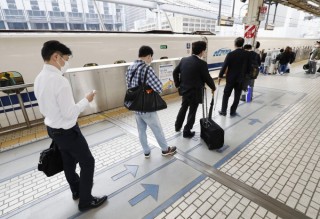Loading
Search
▼ Japan's Travel Campaign Thrown Into Disarray After Minister's Remarks
- Category:Other
Japan's travel subsidy campaign was thrown into deeper confusion Friday when officials had to quickly clarify a recommendation by the tourism minister regarding the contentious program, with his stance on covering cancellation fees facing opposition from a senior member of the ruling coalition.
Tourism minister Kazuyoshi Akaba urged young people and seniors in large group tours not to use the campaign, citing the risk they may spread the coronavirus and, in the case of the elderly, develop severe symptoms.
He said specific age groups and size of tours subject to the advisory were under consideration. But an official at the Japan Tourism Agency said later it would ultimately leave it to the discretion of travel agencies as "it would be difficult to draw a line due to the diverse nature of travel."
The agency is affiliated with the Ministry of Land, Infrastructure, Transport and Tourism headed by Akaba.
On Thursday, the government revised the travel initiative shortly before its start on Wednesday, excluding Tokyo from the program after the capital reported a record number of new coronavirus cases, remaining the area hardest hit by the virus.
The abrupt decision prompted cancellations by people living in Tokyo or planning to visit the capital under the Go To Travel Campaign, which is designed to encourage domestic trips to help revive the virus-hit economy.
Akaba said the government had no plan to make up for fees incurred by such people. But Noritoshi Ishida, policy chief of the Komeito party, called on the government to "consider (compensating for) cancellation fees" following the exclusion of Tokyo from the campaign. The party is the junior ruling coalition partner of the Liberal Democratic Party.
Under the 1.35 trillion yen ($12.59 billion) tourism push, the campaign will eventually subsidize up to half of travel expenses, including accommodation and transport fees, with the government initially providing discounts worth 35 percent of total costs.
The remaining 15 percent will be covered by coupons to be issued after September for food, shopping and other travel activities offered at destinations, according to the tourism ministry.
The government decided to exclude trips to and from Tokyo from the controversial initiative amid concern that the planned nationwide campaign would contribute to a resurgence in virus infections.
Akaba said it was a "gut-wrenching" decision to remove Tokyo but that the capital has become "a center of the viral spread."
Chief Cabinet Secretary Yoshihide Suga also offered an apology over the decision, adding that Tokyo will be restored when the number of infections in the capital goes down.
Despite the decision to exclude Tokyo, concerns remain that some travelers will stay in hotels outside the capital but visit sightseeing spots and restaurants within it, undermining virus containment measures.
Tourists who use train stations in Tokyo and the capital's Haneda airport, meanwhile, will likely be eligible for the government's subsidy campaign as long as they stay at accommodation facilities outside of the capital.
The campaign will offer discounts for those who have already booked trips planned from Wednesday onward if they apply to the campaign operators after returning.
Akaba also said the government will oblige accommodation facilities in the remaining 46 prefectures to take anti-virus measures such as checking the temperature of guests and confirming their identities for them to be eligible for the campaign.
The subsidy scheme was initially slated to begin in August before Japan's Bon holidays around the middle of the month, when many people living in major cities return to their hometowns. But it was moved forward in time for a four-day long weekend from Thursday.
Local government leaders had voiced concern about the initiative, as they feared that the campaign could bring the virus to their regions from the metropolis.
Tokyo, which reported a record of 293 infections on Friday, has raised its alert level to the highest of four amid a recent resurgence of infections.
On Thursday, three prefectures surrounding Tokyo -- Chiba, Kanagawa and Saitama -- as well as Osaka Prefecture also saw their largest numbers of daily cases since the state of emergency was lifted in late May, bringing the nationwide total to 622.
Japan's nationwide infection total reached around 24,200 as of Friday, excluding some 700 from the Diamond Princess cruise ship that was quarantined near Tokyo in February.
- July 18, 2020
- Comment (0)
- Trackback(0)


